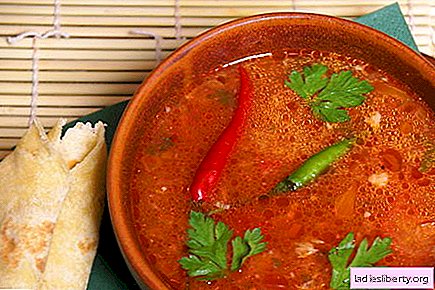
Gout is a disease during which a person's protein metabolism is severely impaired. In this condition, patients are advised to follow a special diet for gout. This article will tell about its features and principles.
Diet for gout: what can
The main objective of the diet for gout is to reduce the content of uric acid in the body.
Thus, the following allowed foods and dishes are distinguished that patients with gout can eat:
1. Pasta from durum wheat.
2. Soups with vegetables and cereals may be present on the diet menu daily.
3. Vegetable oils are available in limited quantities. Flaxseed and olive oil are best.
4. Honey can be eaten, but in small portions.
5. The use of cereals - rice, oatmeal, buckwheat is very useful.
6. Of vegetables, you can eat almost everything, except for some restrictions. At the same time, it is better to give preference to zucchini, potatoes, broccoli, pumpkin, beets and greens.
7. It is allowed to use homemade fruit and vegetable juices.
8. It is very useful to eat all dairy products, especially cottage cheese and kefir. The main thing is that they are not greasy and fresh.
9. Bread can be eaten white, but it must be dried.
10. From sauces you can use light sour cream sauce without hot spices.
11. Often you can eat nuts - almonds, walnuts.
12. Sometimes the menu can be varied with seafood - squid, shrimp, seaweed.
13. The second can be served pickle, beetroot, vegetarian and milk soup.
14. You can eat fish, but not fatty varieties and in boiled form. It is better to eat trout and pollock.
15. From meat you need to choose low-fat varieties (turkey, chicken, rabbit).
16. Eggs can be eaten no more than one per day.
17. Cheeses and milk to be bred are permitted.
18. From sweet you can marshmallows, pears, apples, marmalade and light desserts.
19. From drinks you can drink tea with milk, broth of wild rose, decoction of wheat bran, berry jelly and stewed fruit.
Diet for gout: what you can not eat
When gout is forbidden to eat the following dishes and products:
1. Fish and meat rich broths, as well as jellies.
2. All smoked products (fish, meat, lard).
3. Dishes with the addition of vinegar and citric acid.
4. Any preservation.
5. Sprats, canned fish and meat.
6. Mushrooms in any form.
7. Legumes.
8. Fatty meats (goose, duck, pork).
9. Fatty fish.
10. Everything is fried and salty.
11. Spicy sauces and spices (ketchup, mustard, mayonnaise).
12. Sushi.
13. Offal.
14. Caviar of fish.
15. Sausages.
16. Salted fish.
17. Semi-finished products.
18. Fast food.
19. Fatty varieties of cheeses, as well as fermented milk products with high fat content.
20. Ice cream, cakes, cookies, chocolate and sweets. In general, the use of any confectionery should be limited.
21. Alcohol in any form and quantity is strictly prohibited.
In limited quantities, you can eat these foods:
1. Cocoa can be drunk no more than twice a week.
2. Tea, but not strong. It is better to dilute it with milk.
3. Coffee is not possible often. It should not be strong.
4. Sweet compotes can occasionally. Basically, decoctions of fruits and dried fruits should be drunk without sugar.
5. Whole milk can be drunk no more than twice a week
6. Sausages are possible no more than once a week.
Gout Diet: Weekly Menu
Monday:
1. Breakfast: zucchini soup puree, yogurt, apple.
2. Lunch - nuts, a decoction of dried fruits.
3. For lunch, you can cook pickle, steam chicken patties, boiled beet salad and green tea.
4. Afternoon snack - a glass of kefir and biscuit cookies with raisins.
5. For dinner, cook chicken roll with prunes and sour cream sauce, mashed potatoes and cucumber salad. From drinks - cocoa.
6. Before going to bed, drink a glass of ryazhenka.
Tuesday:
1. For breakfast, cook oatmeal with berries and nuts, green tea and toast.
2. Second breakfast - a baked apple with honey.
3. For lunch, cook buckwheat soup with meatballs. Of the drinks - apple juice.
4. Snack - broth of wild rose, rye bread.
5. For dinner, serve baked fish with vegetables and potatoes, cottage cheese casserole and jelly.
6. Before going to bed, drink a glass of kefir.
Wednesday:
1. For breakfast, serve light carrot and broccoli soup, fruit compote and vegetable stew.
2. Lunch - fruit mousse and juice.
3. For lunch, prepare milk soup with noodles and a boiled egg. From drinks - berry broth.
4. Snack - cottage cheese casserole with fruits, not strong coffee.
5. For dinner, cook rice porridge, cabbage rolls and beetroot salad with cucumber. Mint tea is available from drinks.
6. Before going to bed, drink yogurt.
Thursday:
1. For breakfast, serve cottage cheese pancakes with jam, carrot and apple juice.
2. Second breakfast - a glass of ryazhenka with a bun.
3. For lunch, prepare homemade chicken liver pate with sour cream sauce, borsch and vegetable stew. From drinks - a rosehip broth.
4. Afternoon snack - milk, nuts, honey.
5. For dinner, cook boiled shrimp with sauce, stewed potatoes with carrots and eggplant. Drink green tea.
6. Before going to bed, drink yogurt.
Friday:
1. For breakfast, serve buckwheat soup with herbs, toasts and tea.
2. Lunch - hard cheese, nuts and yogurt.
3. For lunch, cook stewed rabbit with vegetables and buckwheat porridge. From drinks - a decoction of bran.
4. Afternoon snack - apple juice.
5. For dinner, cook boiled fish with rice.
6. For the second dinner, serve kefir and cottage cheese casserole.
Saturday:
1. Breakfast - mashed vegetables, beetroot salad, tea.
2. Second breakfast - banana, fermented baked milk.
3. For lunch, serve beef, hard cheese and rye bread. Drinks include coffee.
4. Afternoon snack - yogurt.
5. For dinner, cook buckwheat porridge, boiled egg and vegetable salad. From drinks - a rosehip broth.
6. Before going to bed, drink warm milk.
Sunday:
1. For breakfast, prepare cottage cheese pancakes with jam and tea.
2. Second breakfast - fruit salad.
3. For dinner, cook chicken skewers in the oven and vegetables. You can drink peppermint tea.
4. Afternoon snack - a glass of ryazhenka.
5. For dinner, cook stuffed fish with vegetables and potatoes. Drink juice.
6. Before going to bed, drink kefir.
This menu is not final. It can be supplemented with other interesting dietary dishes, the recipes of which are now not at all a problem to find.
Gout Diet: Nutrition Principles
There are such nutrition principles for gout:
1. A sick person with gout must definitely observe a certain diet. Thus, you need to eat at the same time, without skipping meals.
2. There should be at least five meals a day, including light fruit snacks.
3. Servings should not be too large so that a person does not overeat. At the same time, starvation is strictly prohibited.
4. A day you need to drink up to two liters of clean water, not counting the liquid from juices, soups, etc. You can also drink mineral water.
5. Dishes should be served at the optimum temperature. Do not eat too hot or cold food.
6. Overweight people are advised to consult an experienced nutritionist, who will additionally prescribe them a diet menu. The main thing is to prevent starvation, as this can lead to the opposite effect from losing weight.
7. Salt and sugar should be completely excluded from the diet.
8. Do not overload the menu with indigestible products. Thus, it is better to eat fish, meat, legumes and liver at different times.
9. Night meals are strictly prohibited. The last meal should be two hours before bedtime. After that, you can only drink water.
10. All meat and fish dishes must undergo heat treatment. It is best to boil them. Extinguishing and steaming is also permitted. As for frying, this method of cooking is strictly prohibited.
11. It is very useful to arrange fasting days with gout, that is, at least once a week to eat exclusively plant or sour-milk foods. Before this, it is still better to consult a doctor.
12. People with gout should avoid overheating, as this can cause deterioration in their condition.
13. All vitamin preparations can be taken, but only with the permission of the doctor.
14. A day you can eat no more than 400 g of carbohydrates and 80 g of fat.
15. The basis of the diet for gout should be liquid foods, vegetables and fruits. Also often you need to eat cereals and dairy products.
16. In the event that, in addition to gout, a person suffers from severe concomitant diseases (diabetes mellitus, hypertension), then the diet should be selected taking into account these pathologies. Also, the patient should be observed by additional specialists.
17. During the treatment of gout, a person should stop smoking and lead a healthy lifestyle.
18. During periods of exacerbation of gout, the patient should eat only liquid or grated dishes in the form of soups or mousses. They will be better absorbed.
Very often gout is detected in people who are overweight. In this case, a special diet is selected for the patient, which is aimed at stabilizing the condition and losing weight. At the same time, this food provides for the practice of fasting days up to three times a week.
When choosing a diet, the doctor must take into account not only the main disease of the patient, but also his weight, age, general well-being and the presence of concomitant diseases.
The overall success of the treatment of gout, alternative methods of its treatment largely depends on the correct observance of dietary nutrition, because even a single overeating or eating fatty foods can significantly worsen the patient's condition.











